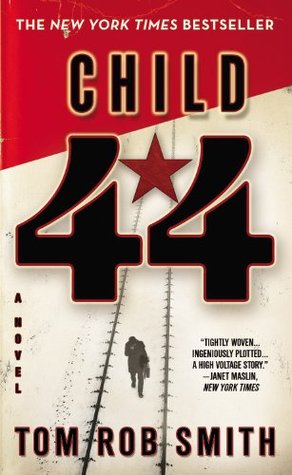My best friend in high school was an immigrant from Poland, and as this was the 1980s, her family felt fortunate to have escaped from behind the Iron Curtain. Once, after Kasia had been telling me about the strain of a childhood under Russian rule, I had remarked, "You must really hate Russians". Kasia was taken aback and said, "I don't hate Russians. The Russian people themselves are the biggest victims of the Soviet government." Even looking back now, that seems an admirably decent position for a 15-year-old to have and was an important lesson for me to learn so early.

Child 44 is set in Stalinist Russia, at a time when just to be mentioned during the torture of a suspected dissident was enough proof to have you and your family rounded up, tortured, and sent to the gulags. To be arrested was a presumption of guilt -- Better to let ten innocent men suffer than one spy escape -- and no one who was brought to the headquarters of the MGB in Moscow's Lubyanka Square was ever set free again. General paranoia and a fear of being denounced strained relationships between husbands and wives, between parents and children, and even in the privacy of one's own cold and crowded home, a person wouldn't dare to question the splendour of their workers' paradise.
To be an apparatchik of the Secret Police at this time, a person would need to either be a power-hungry sadist or a loyal believer in the glorious revolution, and Leo Demidov -- although presumed to be the former by even his wife -- was a simple patriot; a pragmatic functionary who believed he was working for the greater good. When circumstances force Leo to question the status quo, he learns what it is to be an innocent man in the crosshairs of an MGB operation.
Author Tom Rob Smith does a wonderful job of capturing this tense and paranoid atmosphere and Child 44 is an exciting high-stakes thriller. With its meticulously described setting I was completely immersed in 1950s Russia, and I was not surprised to learn that Smith had originally conceived of this story as a movie script: many scenes were cinematically described and the tensest moments have a Hitchcock-like feel (so many trains and crowds!). The plot was energetic and expansive, but ultimately, this is more potboiler than literary masterpiece, and as enjoyable as the journey was, the climax and conclusion rely on coincidence that strain belief (you might even say it has a Hollywood ending). But this ultimate letdown didn't spoil the whole book for me: The opening, set in 1933, is an absolute stand-alone gem that perfectly grabbed me and conditioned my mind for the events to come; and the evolution of Leo Demidov -- as he is confronted with the paradigm-shifting fact that violent crime isn't solely the offshoot of Capitalist decadence as he had been taught -- is an inner journey worthy of a more serious work. With these caveats in mind, the four stars are meant to recognise that Child 44 is a well done piece of genre fiction, not necessarily a magnificent work of literature, and we all need a little candy now and then.

